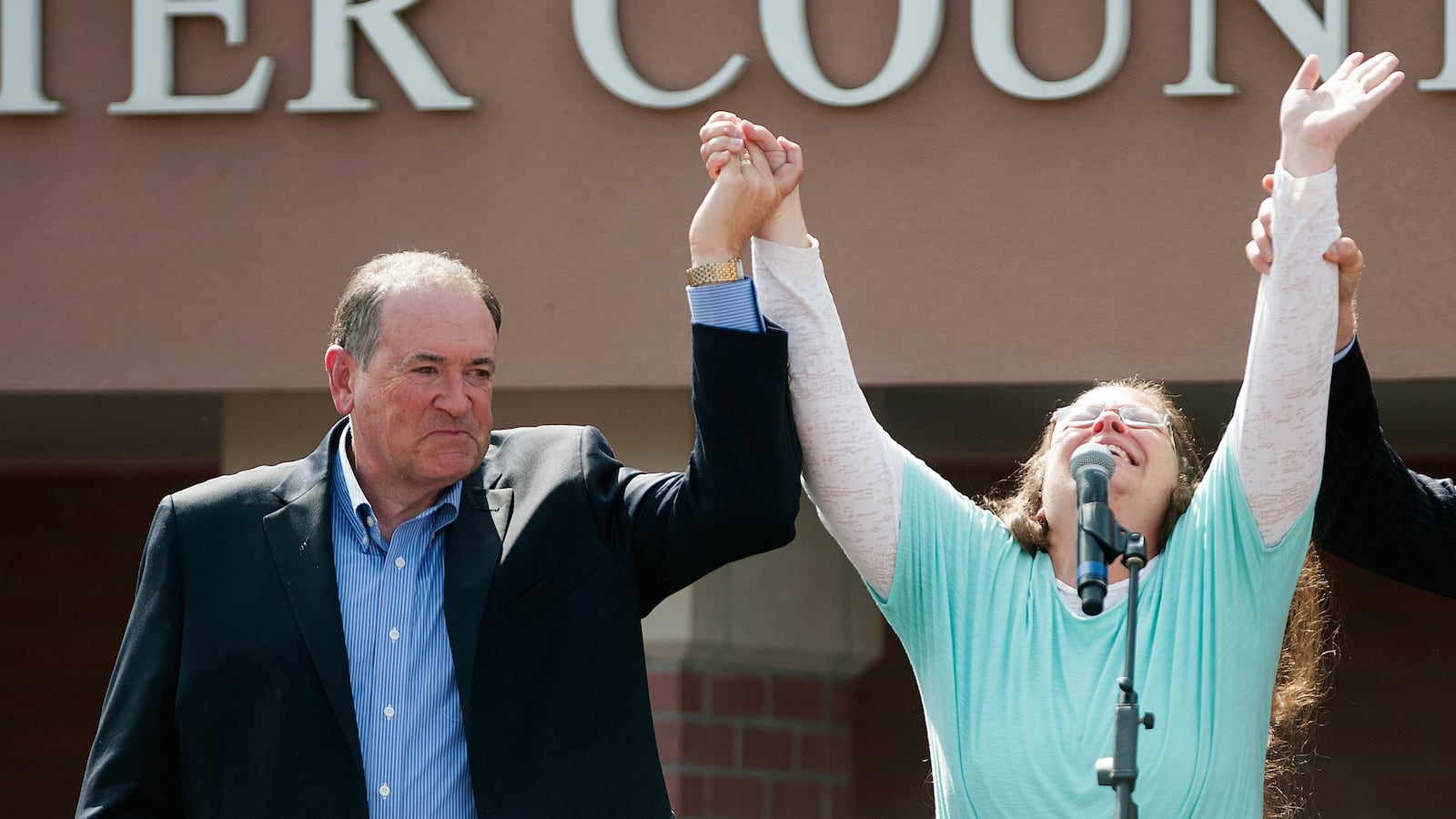On MSNBC last week, Republican presidential candidate and former Arkansas governor Mike Huckabee proclaimed the right for Kim Davis, the recently imprisoned Rowan County, Kentucky clerk, to deny marriage licenses to same-sex couples despite the Supreme Court’s recent 5-4 decision finding that requires her to issue them. According to Huckabee, Davis was only acting in the spirit of Abraham Lincoln, who, he asserted, refused to recognize Dred Scott, the truly abhorrent 1857 decision denying African-Americans, both slave and free, any rights under the Constitution of the United States. And how, claimed Huckabee, did Lincoln ignore Dred? He issued the Emancipation Proclamation.
Huckabee needs to do a little reading. While it is true that Lincoln found the Court’s decision in Dred Scott an abomination, the 16th president recognized that it was the law of the land and that he was obliged to follow it. Furthermore, the proclamation was not, as Huckabee would have you believe, in contradiction to the Court’s ruling. In fact, in what must have struck Lincoln as a delicious irony, he indirectly relied upon Dred as a justification for his power to issue it.
In the summer of 1862, as Lincoln began the delicate process of writing an order to free the slaves, he recognized that the Constitution did not provide him with the power to do so. Slaves, as Chief Justice Roger Taney had reinforced in his opinion in Dred, were property and the act of freeing them was, in effect, a “taking,” barred by the Fifth Amendment. Rather than challenge that, Lincoln decided to go ahead and treat the slaves as property, for once he did, surmised Lincoln, he could, in his power as Commander-in-Chief, free them as an act of war.
All three versions of the Emancipation Proclamation—the one he first read to the cabinet in July 1862, the “preliminary” one he issued publicly in September 1862 that put the South on notice of his intentions, and the final one he signed on January 1, 1863—include language to this effect. In each, Lincoln asserted the act of emancipation was undertaken only as a “military necessity” commensurate with his power to seize enemy property of any kind; human property in this case being no different from non-human property like military hardware, supplies, or rations.
This is one of the reasons why there are no memorable phrases associated with the Emancipation Proclamation. It may be our third most important national document—after the Declaration of Independence and the Constitution—and Lincoln himself prized it more than his Gettysburg Address, more than his Second Inaugural. Still, it contains no great poetry, no language of righteousness. In a memorable phrase, the historian Richard Hofstadter once wrote that the proclamation had “all the moral grandeur of a bill of lading.” But that was Lincoln’s firm intention. This was not a document meant to brandish an outrage over principle. It was, instead, a simple, cold directive to his troops.
Still, as a military act, the proclamation had a major flaw. Once hostilities ended, it would contain no legal force. It was not an order abolishing slavery, could not be an order abolishing slavery, and so, theoretically, those freed by it could be re-enslaved once the war had ceased. Lincoln knew this. The Court’s decision in Dred demanded that this wrong would stand until there was something to contravene it—either a constitutional amendment or a new Court ruling overturning Dred—and it is here that Huckabee’s claim that Lincoln “ignored” Dred becomes more interesting.
Late in 1862, a few weeks before Lincoln signed the proclamation, his attorney general, Edward Bates, issued an opinion as to whether native-born, free “colored men” are citizens of the United States. It was related to, but not the same issue, that the Supreme Court had been asked to decide in Dred. There the Court had determined that Scott, a slave, was not a citizen and could not therefore bring a case for his freedom in federal court. In Bates’s judgment, the Court’s analysis should have stopped with that, because once jurisdiction had been denied, the justices had nothing left to decide. But Taney continued on, asserting that no “colored person” could ever be a citizen of the United States and that slavery could not be barred from the territories. On these arguments, Taney was not joined by a majority. Only he and two others expressed that Scott could not be a citizen by virtue of his race. And so Bates asserted that everything that came after Taney’s opinion that Scott could not bring a suit in federal court, all the truly offensive parts of the Dred opinion, was mere dictum; that is, unnecessary to the ruling, and therefore not binding as law. Working from a “natural rights” argument he borrowed from the political scientist Francis Lieber, Bates then asserted, in direct defiance of Taney’s excess language—but not the law—that all native-born freemen are citizens, irrespective of their race or color. It only followed, then, that slaves freed by the Emancipation Proclamation were citizens from the moment they became free and could not be re-enslaved.
The logic was a bit tortured, but no more so than Taney’s own, and, of course, in time it all became moot. Taney died in 1864 and Lincoln replaced him with his own man, Salmon Chase. The 13th amendment ended slavery and the 14th amendment granted citizenship to all native-born peoples. Now that same amendment, ratified in 1868, is the basis of the ruling last term on same-sex marriages, and the country clerk, Kim Davis, should properly be forced to comply just as Lincoln had to comply with Dred. If Mike Huckabee finds that offensive, he has an opportunity to do something about it. He can get himself elected president and then, like Lincoln, appoint an attorney general and Supreme Court justices who will read the Constitution the way that he reads it.
Todd Brewster is the author of Lincoln’s Gamble: The Tumultuous Six Months that Gave America the Emancipation Proclamation and Changed the Course of the Civil War.






